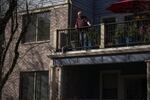Bill Bolstad, 74, has done this before.
He was once under quarantine for two weeks after a stomach virus started going around Hawthorne Gardens, the assisted living facility where he lives in Portland.
“It's really no big deal,” he said. “I have books to read. I have YouTube. I have Netflix.”
In an attempt to limit group gatherings, Hawthorne Gardens is delivering food to residents’ rooms instead of having them eat in the dining room. But, Bolstad said, his life is manageable.
“What other choice do I have?” he asked. “Have a tantrum?”

Bill Bolstad stands on his balcony at Hawthorne Gardens, the assisted living facility where he lives in Portland, Ore., on March 20, 2020. Homes across the state are restricting visitors in an attempt to limit residents’ chances of coming in contact with the coronavirus.
Jonathan Levinson / OPB
Long-term care facilities like retirement and assisted living homes house people who are some of the most vulnerable to the coronavirus. As homes across the state take steps to restrict visitors and limit their residents’ chances of coming in contact with the virus, seniors are adjusting to a reality of highly restricted contact with the outside world.
Bolstad is lucky. He has one of the only balconies at Hawthorne Gardens, so his daughter and friends have come to visit from the street below. He’s a little hard of hearing so visitors have to yell, but he is not enduring complete social isolation. Like much of the country, he is finding his routine interrupted.
“It's another day except that I can't take my afternoon walk to go see my girlfriend,” he laments. “I'd like to be able to do that.”
With health officials saying the pandemic is like going to war, Bolstad has the cool calm of someone who's been in the trenches before.
“You know, more people are going to get sick, and there's going to be some people that die,” he said matter-of-factly.
Earlier this month, in response to Oregon officials reporting people in 34 long-term care facilities were suspected of having the coronavirus, Gov. Kate Brown announced restrictions on nursing homes, assisted living, memory care and residential care facilities.
The restrictions limit all visitors, except essential medical and emergency personnel and people visiting for end of life purposes. Despite the restrictions, it’s neither practical nor desirable to completely isolate these facilities. The staff, for example, are essential and even with the screenings in place, they can still spread the virus.
A staff member at The Springs at Clackamas Woods recently tested positive for COVID-19, but CEO Fee Stubblefield said because of steps they took in February, the employee never came to work while symptomatic.
“We extended sick leave to all employees whether they were sick or their family were sick,” Stubblefield said. “We didn’t ask any questions — we’re paying you.”
This weekend, days after an employee tested positive, two residents of Regency Park Assisted Living Memory Care tested positive for COVID-19 and have been hospitalized.
By Monday, a third resident and second employee had tested positive. One resident had died.
Oregon state Sen. Sara Gelser, D-Corvallis, chairs the Human Services Committee, which oversees foster care, intellectual development disability services and home care for seniors.
Gelser’s son, Sam, an adult with an intellectual disability and underlying medical conditions, is particularly vulnerable to the coronavirus. He lives in a house with other people who have disabilities. Care providers come in to help, but the house isn’t owned by a group home. It’s an informal arrangement that allows for some independence.
Those care providers are out in the community. They have to go grocery shopping. They likely come into contact with their own family members and loved ones.
To keep her son safe, Gelser has brought him back home for the time being and said she basically has him in a bubble.
“Trying to shut down all of those loops to keep him not exposed to the virus is a lot of work,” she said.
Getting sick is scary, but Gelser said she looks at other countries like Italy, where they’ve had to ration medical care based on years of life they can save or other utilitarian considerations, and her fears are compounded.
“If he's sick at the height of the outbreak where there isn't enough material to care for him, he and other people with disabilities are not going to win the health care lottery,” she said.
Two weeks ago Rob LaRaus visited his parents at their Portland retirement community and told them he wasn’t sure when he’d be able to come back.
His mom, who is 80 and has Parkinson’s disease, mirrored Bolstad’s collected calm.
“She said, ‘Oh yeah, I get it because it gets in here; it's going to wipe this whole place out,’” LaRaus said.
